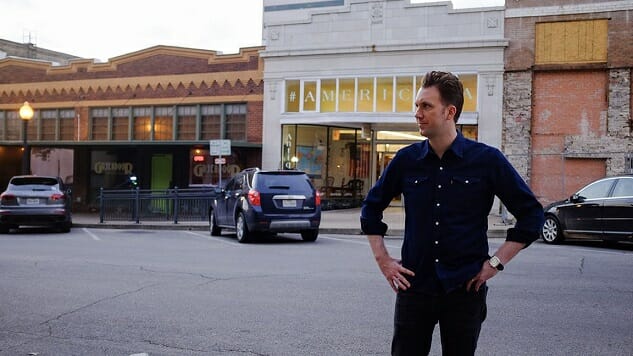Jordan Klepper Talks about Weaponizing His Privilege on His New Comedy Central Show
Photo courtesy of Comedy Central
Comedy Central keeps looking to Jordan Klepper to save them.
Well, maybe not save them. There’s an infinite number of South Park episodes to re-run, and who doesn’t love revisiting We’re The Millers? But when it comes to original, vital content, Comedy Central keeps giving Klepper prime opportunities. The Chicago improv comic became a Daily Show correspondent under Jon Stewart in 2014, and stayed with the show under Trevor Noah into 2017. The network encouraged him to develop an hour long special, slightly more serious in nature, called Jordan Klepper Solves Guns. This lead into The Opposition with Jordan Klepper, wherein the Klepper character leaned-in to an Alex Jones conspiracy activist character, with citizen journalists as correspondents. Creating a nightly news show with a hyper-specific tone and focus proved to be difficult, and the show was cancelled in summer 2018.
But immediately upon cancellation, Comedy Central had already announced the pick-up of a new Klepper show. See what I’m talking about? The moment one Klepper project at CC ends, they’re ready to announce a new one. As much as I’ve enjoyed Klepper’s previous work, I’m much more excited for— and concerned about— the new one.
On May 9, Comedy Central premieres a new weekly show with Jordan Klepper. It’s called Klepper. I know it may be difficult to remember, but you may want to write this down. Because it’s incredibly good and it has no discernable business being on Comedy Central. It’s an intensely assembled, aggressive sequence of field pieces and interviews, structured around weekly themes of a nature that would be difficult or too complicated for serious journalists to tackle. Klepper hosts as himself, without a trace of his former character-based heightening, and the result is an often-affecting yet comedically engaging dragging of our national darkness into the cleansing light.
It’s a different approach to the kind of bummer comedy journalism you’d expect from a Last Week Tonight or an Adam Ruins Everything. But perhaps more importantly, it’s finally the perfect Jordan Klepper vehicle.
Paste recently talked to Jordan Klepper ahead of the release of his new show. Here’s what he had to say.
Paste: To get started, let’s talk about The Opposition: did you feel that the show got to serve its purpose with the time it was given? Do you feel good about the run?
Jordan Klepper: I was really proud of The Opposition. It was definitely a challenge to keep filtering everything through that perspective, day in and day out. Sometimes we wish we had a more nimble ship where we could go right at an idea, as opposed to figuring it out backwards. But I loved doing that, I would’ve loved to continue doing it and reacting to the chaos that’s sort of been happening around us. With that being said, I think we’re shifting, and shifting quickly. The world of Alex Jones as we see in the news today…those guys are going farther and farther out of our consciousness, if you will. In a nutshell, I do stand by and feel really proud of 100 plus episodes that we did. I was bummed when it ended for sure, it was mixed with other strange feelings of excitement at getting to do something opposite.
Paste: With Alex Jones being banned from Facebook recently… after he was banned, he was on Facebook live-streaming about his ban from Facebook, which was one of the most surreal things I’ve ever seen in my life.
Klepper: [Laughter] That’s pretty amazing.
Paste: Yeah, I wish that The Opposition was still on obviously, but also I’m like, as we’re deplatforming these assholes, maybe it doesn’t need to be there in that same way. Did making a show through that perspective ever put in you in the same place as people having to cover Trump seriously all day? Was it sad to think of jokes from that angle?
-

-

-

-

-

-

-

-

-

-

-

-

-

-

-

-

-

-

-

-

-

-

-

-

-

-

-

-

-

-

-

-

-

-

-

-

-

-

-

-








































